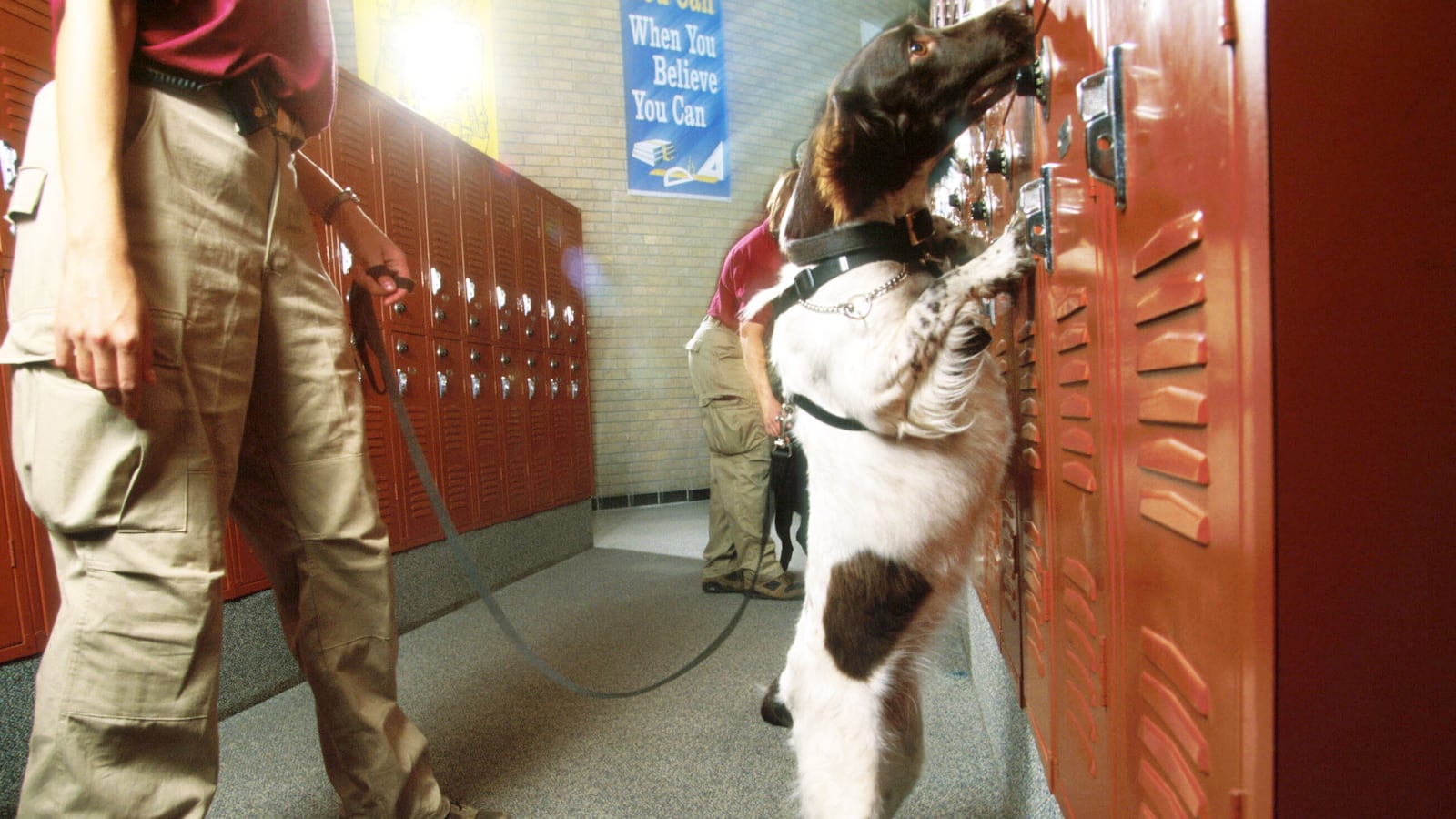A high school student was tackled and handcuffed at an Aurora school last month after a drug-sniffing dog found marijuana edibles in his backpack.
The incident, which Aurora school district officials say they are now investigating, has sparked outrage at the district and prompted a larger conversation about school security as well as the practice of regularly searching schools with a hired K9 trained to sniff out drugs and weapons.
“It made us all feel uncomfortable,” said Marcus Macias, a student at Hinkley High School, who witnessed the incident and spoke to the school board about it. “The way they tackled that kid and put all that force on him, I don’t feel safe being at Hinkley. I didn’t expect that.”
Teachers who also spoke to the school board earlier this month said they couldn’t believe what happened in their school that day, and shared stories about their students being traumatized as they heard the boy screaming that he couldn’t breathe. According to witnesses, the boy was handcuffed by a campus monitor, who is a district employee.
Board members, who were unaware of the district’s practice of hiring dogs for school searches, asked the district for more information. Most said they had concerns, but also didn’t want to jump to conclusions.
Since then, Aurora Public Schools provided data showing that this school year the district has conducted 28 searches at Aurora schools with a hired drug-sniffing dog.
The district usually hires the trained K9, a springer spaniel, twice a year, from a Texas-based company called Interquest. District officials send out notices to principals of middle and high schools, and then school leaders can decide if they want a visit from the dog at that time.
School leaders also get to determine where they want the dog to search. Each visit takes about 45 minutes, so schools aren’t usually swept from top to bottom.
The neighboring Cherry Creek School District also periodically uses drug-sniffing dogs from local police departments, according to a spokeswoman, who said it was a “preventative strategy” to keep drugs out of schools. Jeffco Public Schools officials said they have used law enforcement dogs to search schools a handful of times in the last few years.
In Aurora, 26 of the searches this year resulted in officials locating drugs — a significant increase from last year when only 3 of 26 searches resulted in a find. When the dog finds something, Greg Cazzell, the district’s security director, said the school administrators or security officials are supposed to pull the student aside and further investigate.
During the case at Hinkley, teachers and students said the student turned to run, and that’s when security officials ran after him and tackled him.
According to a district statement about the investigation into the incident, following district policy, “appropriate school staff are trained to only use physical intervention when it is necessary to protect the student, themselves or other students and staff from harm.” The investigation is looking into whether this case actually fit that need.
Aurora has used dogs to search schools randomly since the late 1990s. There is no contract with Interquest. The program costs about $6,000 annually, officials said.
“It’s a deterrent,” Cazzell said. “Students know there will be searches conducted.”
But teachers and activists who spoke to the school board say that’s not a good reason.
According to statements from teachers, the student at Hinkley who allegedly had the edibles in his backpack was a student who had an IEP, a plan required for students identified as having special needs.
“Why do we bring drug dogs into classrooms by employees who don’t know the school, don’t know the community and don’t know our students, when we have people in the building who do and who are able to address these same issues without the trauma,” asked Brian Lindstrom, a Hinkley teacher, speaking to the school board. “Do you feel like the trauma created in our community, that already has historical trauma, was worth the five edibles found? Because I don’t think it was worth it.”
Vinnie Cervantes, an organizing director for the Denver Alliance for Street Health Response, an organization looking for alternatives to safety issues, directly asked the Aurora school board to make a change and re-evaluate the role of campus monitors and policing in schools.
“It disrupts the entire education process,” Cervantes said. “Teachers have an incredible burden trying to manage their classrooms, and then teachers are going beyond that to try to build relationships with students, especially those that have a history of different behaviors, but all of that gets destroyed when this happens.”
Cervantes also pointed out that the district’s own data, like elsewhere, shows racial disparities. The student who was handcuffed was black.
Just last month, Aurora officials presented a report on discipline data to the school board which showed that black students are disproportionately represented among those who are disciplined.
“This is a great wake-up call,” activist Cervantes said. “We can do better.”

